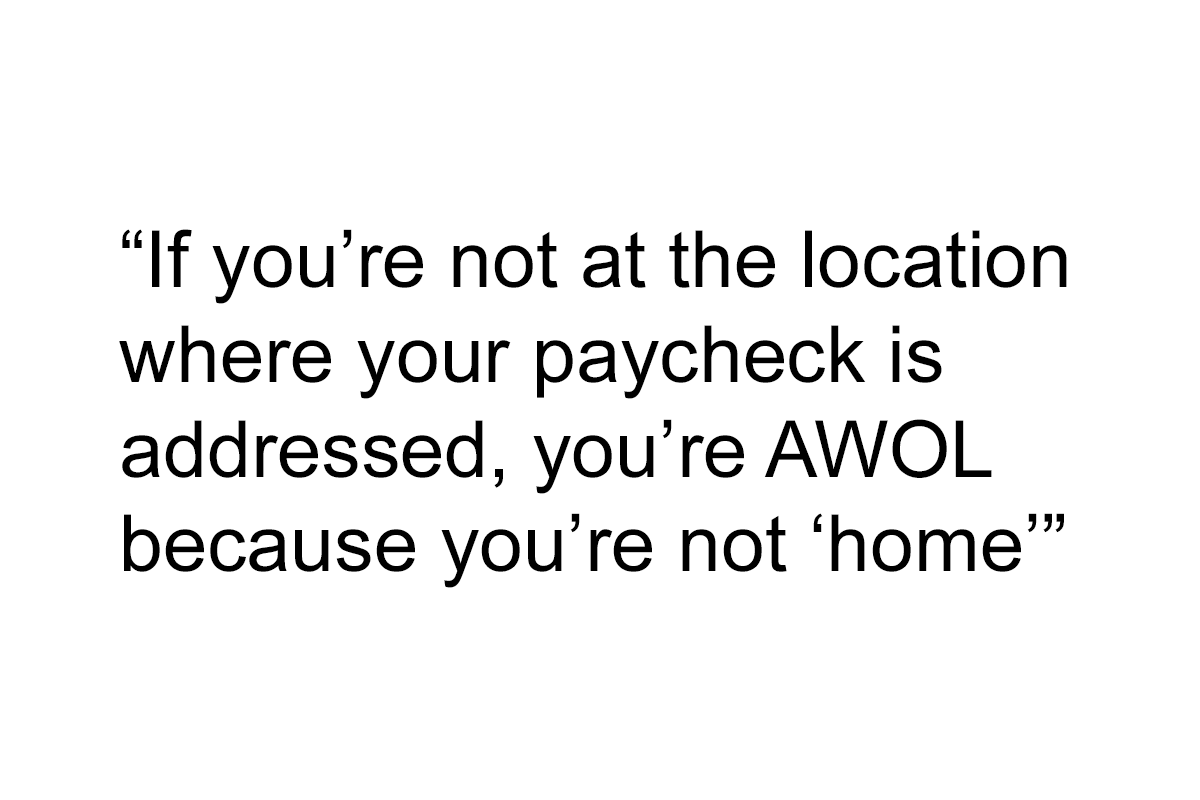
Boss Refuses To Admit To His Hilariously Dumb Mistake, Enforces An Absurd Work-From-Home Policy Instead
Interview With AuthorWorking from home has been a very spicy topic over the past two and a half years. It’s a topic that we’ve covered in great detail here at Bored Panda. While some companies have embraced fully remote or hybrid work and have given their employees more flexibility, others have doubled down on waging war on these sorts of policies because of the lack of trust, the desire for in-person communication (and oversight), and a host of other reasons.
Some work-from-home policies, however, aren’t made using logic. Instead, they’re dictated by radically embarrassing misunderstandings. And instead of owning up to these mistakes, the higher-ups would rather inconvenience the entire company to cover up their failures.
In a story that will have you facepalming very hard, one redditor, a veteran sysadmin and developer with decades of experience, shared how a senior administration official saw someone’s Zoom tropic theme background and moved to rework the entire company’s WFH approach because he thought someone was actually working at the beach.
Scroll down for the two full posts shared on r/sysadmin, in the redditor’s own words, as well as to see how the internet reacted. What do you think about what happened, Pandas? What’s the WFH policy like at your job? You can share your thoughts and opinions with everyone else in the comments—we’d love to hear about your experience with remote work policies.
Bored Panda got in touch with the author of the posts and had a friendly chat with them about WFH culture. “It has been my personal experience that most managers think their employees do nothing but goof off when working from home, rather than focusing on productivity. I’ve personally heard HR personnel make general disparaging comments about WFH arrangements,” the OP said.
“Rather than focusing on the fact an employee produced X number of widgets on average each WFH day, which mimics their in-office average daily widget count, managers obsess over the fact the employee may be taking a long lunch, nap, doing laundry, etc., during the work-day and view that as ‘stealing’ (time) from the company.”
While some companies embrace hybrid or fully remote work, others have a tough time adapting
Image credits: Oladimeji Ajegbile (not the actual photo)
One employee shared how a senior official’s misunderstanding when he saw a Zoom background led to him changing the entire firm’s WFH policy
Image credits: Vlada Karpovich (not the actual photo)
Image credits: STUNTP***S
The author of the two posts shared some of his thoughts about the future of working from home, and how the culture might shift over the coming few years. In his opinion, the changes will depend a lot on the company industry and culture, as well as the people in positions to make decisions about WFH.
“My wife has been WFH for the past decade, but she works for a company that is very forward-looking and most of their employees are at client sites anyway so they’re not in an office, to begin with. I only went WFH when COVID hit and now I need to sign a WFH ‘contract’ every semester and my WFH schedule is highly regulated with no flexibility. Because, well, we’re all goof-offs and we need management’s knee on the back of our neck to make sure we do our work and don’t goof-off and ‘steal’ the company’s time, right? Frankly, the whole thing is insulting and laughable because management talks [nonsense], at the same time talking about promoting a positive ‘climate,’ while treating its employees like children,” the redditor was frustrated with the way management approaches things.
The OP, whose office is a 35-minute drive away, provided an example of just how ridiculous things can get when it comes to worker flexibility. According to his ‘contract,’ his WFH days are Wednesday and Thursday. “Nobody is allowed to WFH on Monday or Friday, because, well then we’d just goof off for a long weekend, right? I’ve actually heard HR and management make statements like that,” he pointed out just how condescending some of the higher-ups are.
“I had my annual physical (prescheduled) on a Friday at 1pm. I asked my boss if I could swap Wednesday for Friday so I could go to my doctor’s appointment, 15 minutes away in the opposite direction of work, and still be productive that day. I was told no, you can’t WFH on a Friday, and besides, WFH isn’t so you can go to a doctor’s appointment. So my options were either to go in to the office on a Friday, leave to drive 50 minutes to the doctor, go to my appointment, drive 50 minutes back, finish the work day, and then drive home. Or take a sick day and enjoy my day off with a minor inconvenience in the middle when I had to go to that appointment,” he said.
“Guess which one I chose? Yup. I took the ‘free’ day off and enjoyed most (since who really enjoys their annual physical?) of the day at my employer’s expense, all the while laughing at the stupidity of my manager.”
Look, we get it, Zoom backgrounds are pretty nifty. The first time yours truly saw them, I couldn’t help but be impressed by the quality of the themes. However, they’re still very clearly fake. Though it’s not out of this world to assume that someone who’s entirely unfamiliar with the tech might mistake one of the themes for an actual location.
Though to be so stubborn as to not admit to having a mistake is just… disappointing. Employees often expect their superiors to know better and have higher standards, however, the truth of the matter is that everyone’s very much human. Arrogance, entitlement, shame, guilt—these issues don’t go away just because you get a promotion or two. That’s why it’s so important to know how to manage your managers: give them valid criticism diplomatically, while also offering solutions to the problem. Though, granted, far from every superior is open to any kind of employee input.
The r/sysadmin subreddit had a field day with the story. Some redditors quipped that the official would have his mind blown if he ever saw a Zoom space background. While another quipped: “Attention Staff. By new mandate, all employees must work from within the solar system, or be declared AWOL.”
Though embarrassment is far from pleasant, it’s actually a healthy and mature reaction to embrace it. Otherwise, it might morph into deep-seated shame later on. Vanessa Bohns, from Cornell University, previously explained to Bored Panda that displaying signs of mild embarrassment can actually be socially constructive. People can feel more sympathetic towards you if you admit to making mistakes.
If instead, we run away from our embarrassment, our social capital is likely to go down. In other words, your reputation suffers if you pretend that you haven’t messed up. People respect you more if you’re honest about your flaws.
“What you want to be careful not to do is to let embarrassment morph into the more destructive self-conscious emotion of shame, where you feel so badly about a minor mistake that you start to think there is something wrong with you and feel the need to completely disappear and hide away yourself,” Bohns said.
Meanwhile, workplace expert and author Lynn Taylor explained to Bored Panda why working from home is such a contentious issue for some managers. “The fear of ‘out of sight, out of mind’ looms large,” she said how some managers think.
“For some companies, industries, and positions, employees do need to be on site. But for those where it won’t affect their work product, managers must be open-minded about offering the flexibility and freedom of working from home. That is if they want to attract and retain the most qualified people,” she told us.
“One of the reasons some managers are opposed to work-from-home policies, for example, is they feel there is a lack of productivity when you can’t meet face-to-face. They believe that project teams are less effective when working offsite,” the workplace expert said.
“Managers may feel their own results and successes are negatively impacted because they can’t interface personally with their staff; brainstorm as easily, or react to unexpected issues on the spot. They may also feel they can’t train their employees properly when they’re offsite. For others, it’s simply resistance to change. If they’re much more traditional in their management approach, they may want to exert maximum control over their staff and be assured everyone is committed.”
Here’s how some internet users reacted to the WFH drama
Moron would have got a lot more respect from his subordinates if he had just said "my bad, sorry". Would also have got some goodwill with people being more likely to assist him in the future.
Yep. Now this policy is going to stand as a reminder to everyone that he is astoundingly out of touch with modern work technology. He should probably retire. He could've let this go once it was explained and people would've largely forgot. Most people would've never known. Now he looks like your senile grandpa pitching a fit because it's past his nap time.
Load More Replies...someone uses the potato filter & the next day there's a new policy about shapeshifting during work hours
What kind of psychopath works while at the beach or on vacation? If you are on vacation, then BE ON VACATION!!
I work from my parents house occasionally... especially the workday before/after a holiday so I can travel there without holiday traffic (they live 3.5 hours away - same state though). A lot of people have also been doing long term vacation rentals during the summer so their kids can be on vacations and they work from the rental during the day and enjoy the trip on evenings/weekends. It also allows people whose spouses travel a lot for work to accompany them - like travelling nurses who have anywhere from 2 week to 3 months contracts. If my spouse did that and we didn't have kids I would use remote work to my benefit to spend less time away from my spouse.
Load More Replies...The issue with working somewhere other than your home, atleast in my company, is that it causes undue distractions. And so people are not as focused on their work. We have several people at my company who thing working from home means working from Starbucks, where they frequently miss calls or emails go unanswered for long periods because the didn't hear their computer or phone ping/buzz. Also, people like to do things in the middle of the work day like change the oil on their car or work on the bathroom remodel they started. These are not thing you should be doing in the middle of a work day!!! Bottom line you should be as available to other employees when working from home as you would be in the office.
That sounds like there is not a good system for tracking projects. In my organization, we track individual assigned tasks. If a task is large, we break it down into smaller, easily tracked chunks. We update these things daily. There is no way I could goof off for hours during my work day and complete my tasks. It wouldn't matter where I was working. A person looking at me can't tell what I'm doing anyway unless they want to park themselves over my shoulder. If that's all my manager had to do with their time, they'd be a waste of a paycheck. They can tell I'm productive enough to earn my pay because I produce trackable work product. Employers should focus on whether your work is done well, and on time.
Load More Replies...First of all, how do they know you're in your house? I've had to take meetings in alternate rooms before when the room I normally use was occupied. Second, one of the perks of working from "home" is that you can travel if you need to. My mother's mom is almost 85 and she lives 9 hours away. Sometimes my mother has to go and see her, like if she is hospitalized for example. Luckily, my mother works from "home" and can do that without taking time off work. Third, as long as work gets done, who CARES where you are? This is totally a case of jealousy.
the only thing they could enforce is to work from inside your country ( or maybe state in the US) as there may be different taxes applied. we have a maximum of 10 days work from other country per year but it must be within the EU. otherwise why should they care if you are at your boyfriend's or parents' house? 🤷 and yes they could find out but need the IT involved so who has time for it. unless there is some severe suspision
I would attend every zoom meeting with different backgrounds. The beach, skiing, on Mount Everest, by the pool, in a taxi, on the roof, anything I could think of. Or just take a pic of your living room wall and use it if they complain. In fact, I switch it in mid meeting.
So I guess then they have to allow you to miss work if your internet is down? No, sorry I can't go elsewhere like a coffee shop, that's the policy.
How can you admit you are non value added with out admitting you are non value added
I have a cold and wintery forest as my background on teams. don't think anyone really thinks I'm sat in snowy woodland.
Guess I better work from my bank as my pay is directly into my account!
In comparison: my work took 20 of us to stay in a villa in Lanzarote, working during the day and vacationing the rest of the time. We also have lots of staff who go abroad for a month or so and work from there. As long as it doesn't affect your productivity, I see no problem with it
I used to work at a site with a friend whose job was AI computer graphics. He was the only member of his team in the country but his boss insisted he had to work from the office and announced he would start checking the badge reader records on the building to make sure he was. The boss did not understand what his team did and this was pre-COVID so my friend made a background of his office for conference calls and kept working from home. He lived close to the site so each morning he'd hit the Starbucks across the street from the office, badge in the office door, then go back home. When COVID hit and the boss started getting suspicious, he switched his background to a live feed of a desk cam in his office pointing out the window. Company ended their lease end of COVID because "on average, only 1 person comes to the site each day".
Those of us who have to go into the office every day because our job position makes it necessary, think ya'll a bunch of entitled cry babies. There, I said it. I would LOVE to be able to work from home.
"If I can't have it better NOBODY should have it". Close thy mouth, entitled biddy. There. I said it.
Load More Replies...You're paid to be available. It's called accountability, and too many people have pushed the boundaries. People should no longer be surprised when companies announce a return to office policy. Don't blame the idiots at work; blame the idiots who ruined it for everyone else.
And what indication do we have that somebody was unavailable?
Load More Replies...So here's a solution...everyone work from the beach and have a home office as a background. I have a virtual background that is the New York location in Dr. Strange with the window in the back. Then some of my non-Marvel friends messaged me and said "Is that Harry Potter?" Uh..no. Dr. Strange is cooler....
The number of meetings I’ve zoomed into while walking to pick up my kids from school is ridiculous. 🤣 I spent 2 years working 100% efficiently from home but now they need me in the office? Efficiency is now down as I can’t double work on emails during meetings… 😩
We lucked out in that my company let the employees decide where to work. It turned out to be the right move as our company had double the profits this last season. Probably because people can get more done when they have a choice. I work from home most of the week so I have time to get laundry done and kitchen/dishes done between working and meetings. Frees up my weekend so I can do what I want instead of playing catch up.
Load More Replies...Actually, some of my workmates do go "on vacation" or rather they do travel to beautiful places with nice weather and beaches and work from there. I don't really see a problem or how that is even the employer's business as long as the employee does work his/her hours and gets the work done. Corona was depressing enough with all the social distancing and being stuck at home. Why not make the best out of it now that a lot of jobs allow to work remotely?
Moron would have got a lot more respect from his subordinates if he had just said "my bad, sorry". Would also have got some goodwill with people being more likely to assist him in the future.
Yep. Now this policy is going to stand as a reminder to everyone that he is astoundingly out of touch with modern work technology. He should probably retire. He could've let this go once it was explained and people would've largely forgot. Most people would've never known. Now he looks like your senile grandpa pitching a fit because it's past his nap time.
Load More Replies...someone uses the potato filter & the next day there's a new policy about shapeshifting during work hours
What kind of psychopath works while at the beach or on vacation? If you are on vacation, then BE ON VACATION!!
I work from my parents house occasionally... especially the workday before/after a holiday so I can travel there without holiday traffic (they live 3.5 hours away - same state though). A lot of people have also been doing long term vacation rentals during the summer so their kids can be on vacations and they work from the rental during the day and enjoy the trip on evenings/weekends. It also allows people whose spouses travel a lot for work to accompany them - like travelling nurses who have anywhere from 2 week to 3 months contracts. If my spouse did that and we didn't have kids I would use remote work to my benefit to spend less time away from my spouse.
Load More Replies...The issue with working somewhere other than your home, atleast in my company, is that it causes undue distractions. And so people are not as focused on their work. We have several people at my company who thing working from home means working from Starbucks, where they frequently miss calls or emails go unanswered for long periods because the didn't hear their computer or phone ping/buzz. Also, people like to do things in the middle of the work day like change the oil on their car or work on the bathroom remodel they started. These are not thing you should be doing in the middle of a work day!!! Bottom line you should be as available to other employees when working from home as you would be in the office.
That sounds like there is not a good system for tracking projects. In my organization, we track individual assigned tasks. If a task is large, we break it down into smaller, easily tracked chunks. We update these things daily. There is no way I could goof off for hours during my work day and complete my tasks. It wouldn't matter where I was working. A person looking at me can't tell what I'm doing anyway unless they want to park themselves over my shoulder. If that's all my manager had to do with their time, they'd be a waste of a paycheck. They can tell I'm productive enough to earn my pay because I produce trackable work product. Employers should focus on whether your work is done well, and on time.
Load More Replies...First of all, how do they know you're in your house? I've had to take meetings in alternate rooms before when the room I normally use was occupied. Second, one of the perks of working from "home" is that you can travel if you need to. My mother's mom is almost 85 and she lives 9 hours away. Sometimes my mother has to go and see her, like if she is hospitalized for example. Luckily, my mother works from "home" and can do that without taking time off work. Third, as long as work gets done, who CARES where you are? This is totally a case of jealousy.
the only thing they could enforce is to work from inside your country ( or maybe state in the US) as there may be different taxes applied. we have a maximum of 10 days work from other country per year but it must be within the EU. otherwise why should they care if you are at your boyfriend's or parents' house? 🤷 and yes they could find out but need the IT involved so who has time for it. unless there is some severe suspision
I would attend every zoom meeting with different backgrounds. The beach, skiing, on Mount Everest, by the pool, in a taxi, on the roof, anything I could think of. Or just take a pic of your living room wall and use it if they complain. In fact, I switch it in mid meeting.
So I guess then they have to allow you to miss work if your internet is down? No, sorry I can't go elsewhere like a coffee shop, that's the policy.
How can you admit you are non value added with out admitting you are non value added
I have a cold and wintery forest as my background on teams. don't think anyone really thinks I'm sat in snowy woodland.
Guess I better work from my bank as my pay is directly into my account!
In comparison: my work took 20 of us to stay in a villa in Lanzarote, working during the day and vacationing the rest of the time. We also have lots of staff who go abroad for a month or so and work from there. As long as it doesn't affect your productivity, I see no problem with it
I used to work at a site with a friend whose job was AI computer graphics. He was the only member of his team in the country but his boss insisted he had to work from the office and announced he would start checking the badge reader records on the building to make sure he was. The boss did not understand what his team did and this was pre-COVID so my friend made a background of his office for conference calls and kept working from home. He lived close to the site so each morning he'd hit the Starbucks across the street from the office, badge in the office door, then go back home. When COVID hit and the boss started getting suspicious, he switched his background to a live feed of a desk cam in his office pointing out the window. Company ended their lease end of COVID because "on average, only 1 person comes to the site each day".
Those of us who have to go into the office every day because our job position makes it necessary, think ya'll a bunch of entitled cry babies. There, I said it. I would LOVE to be able to work from home.
"If I can't have it better NOBODY should have it". Close thy mouth, entitled biddy. There. I said it.
Load More Replies...You're paid to be available. It's called accountability, and too many people have pushed the boundaries. People should no longer be surprised when companies announce a return to office policy. Don't blame the idiots at work; blame the idiots who ruined it for everyone else.
And what indication do we have that somebody was unavailable?
Load More Replies...So here's a solution...everyone work from the beach and have a home office as a background. I have a virtual background that is the New York location in Dr. Strange with the window in the back. Then some of my non-Marvel friends messaged me and said "Is that Harry Potter?" Uh..no. Dr. Strange is cooler....
The number of meetings I’ve zoomed into while walking to pick up my kids from school is ridiculous. 🤣 I spent 2 years working 100% efficiently from home but now they need me in the office? Efficiency is now down as I can’t double work on emails during meetings… 😩
We lucked out in that my company let the employees decide where to work. It turned out to be the right move as our company had double the profits this last season. Probably because people can get more done when they have a choice. I work from home most of the week so I have time to get laundry done and kitchen/dishes done between working and meetings. Frees up my weekend so I can do what I want instead of playing catch up.
Load More Replies...Actually, some of my workmates do go "on vacation" or rather they do travel to beautiful places with nice weather and beaches and work from there. I don't really see a problem or how that is even the employer's business as long as the employee does work his/her hours and gets the work done. Corona was depressing enough with all the social distancing and being stuck at home. Why not make the best out of it now that a lot of jobs allow to work remotely?




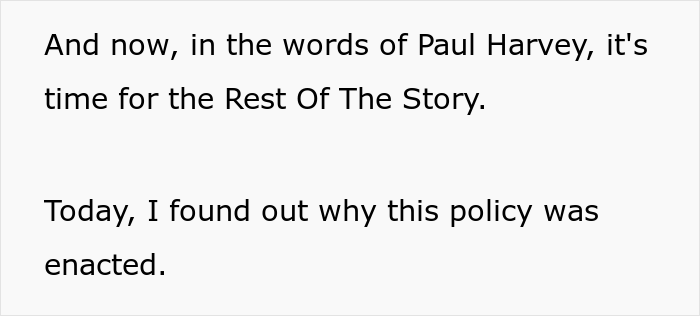
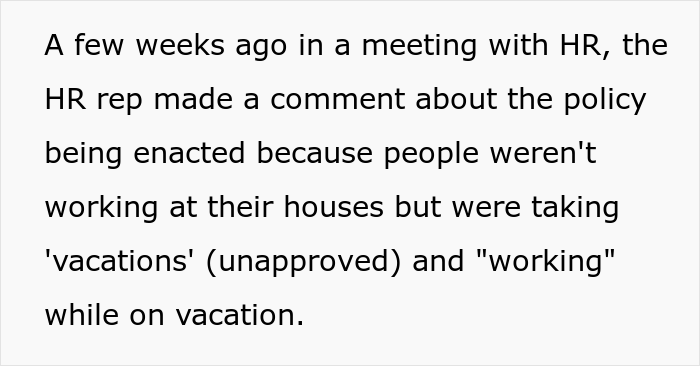




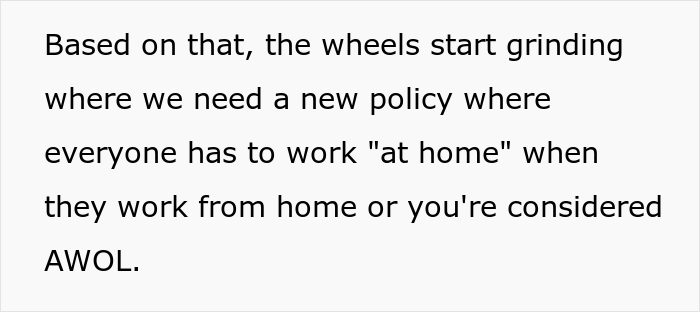
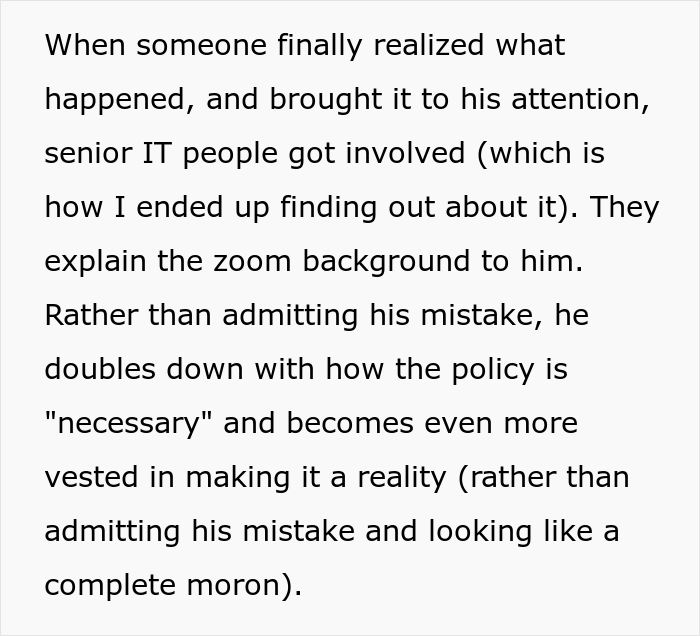

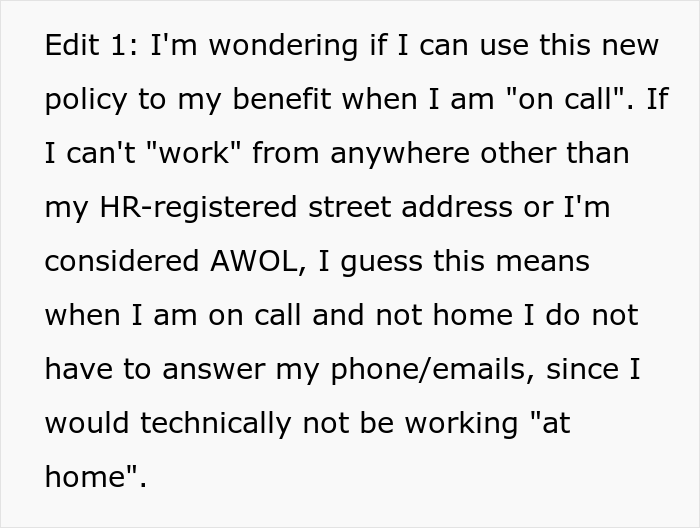






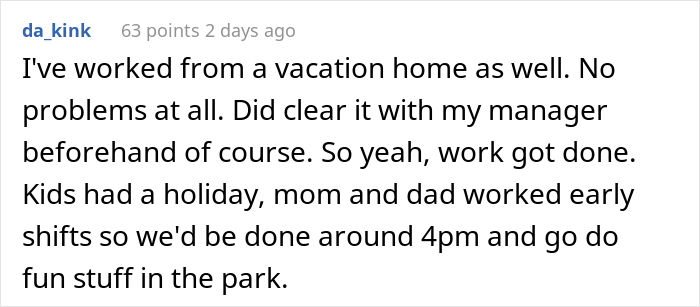







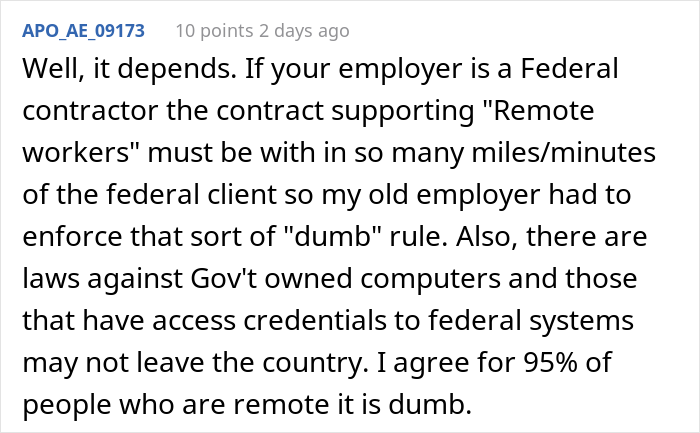






103
59